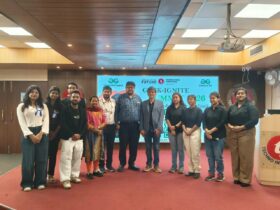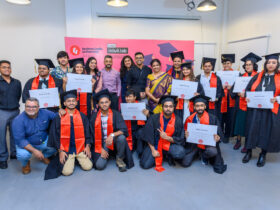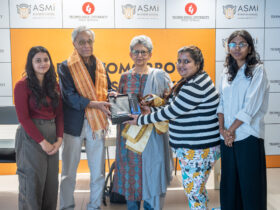The field of Electronics and Communication Engineering is on the cusp of a transformative phase in India—driven by rapid advances in hardware-software convergence, telecommunications, embedded systems, IoT and semiconductor manufacturing. For students enrolling in a B.Tech Electronics and Communication Engineering course, this means both significant opportunities and evolving expectations.
What the Electronics and Communication Engineering Course Means
A B.Tech in Electronics and Communication Engineering (ECE) prepares students to design, develop and implement electronic systems and communication networks. It covers core concepts such as analog electronics, digital logic, microprocessors, solid-state devices, analog and digital communication, satellite communication, integrated circuits, antennae and wave propagation, as well as microwave engineering. This domain bridges the physical world of hardware with the interactive world of communications and connectivity.
Our department at Techno Bengal Institute of Technology in Kolkata began its journey in the year 2000. Since inception, we have cultivated a strong reputation in the region, backed by modern laboratory infrastructure spanning electronics, digital electronics and microprocessors, communications, optical and microwave communication. Many of our alumni now hold key positions at national and international organisations—a strong indicator of the course’s relevance and our commitment to quality education.
Why Choose to Study ECE in Kolkata?
Choosing to study Electronics and Communication Engineering in Kolkata offers several advantages: being in a metropolitan region provides access to industry, research and technological infrastructure; the presence of long-established institutions ensures peer networks and academic mentors; and our college offers targeted support through labs, seminars and placement assistance. Admission in Electronics and Communication Engineering at our college means you’ll be stepping into a proven environment—not just for theory, but for hands-on learning with equipment and communication systems.
Scope and Opportunity for B.Tech Electronics and Communication Engineering in India
The scope of ECE in India is strong—and evolving. According to a recent report, the employability rate for ECE graduates in India stood at approximately 58.9%. While that figure shows room for improvement, it also reflects a broad base of opportunity across hardware, communication, embedded systems and more.
Key trends driving growth include:
- India’s electronics manufacturing sector already employs around 2.5 million people and is set for further expansion.
- The push under “Make in India”, the PLI (Production-Linked Incentive) schemes, and the implementation of advanced communication technologies such as 5G and R&D into 6G are creating new roles for ECE engineers.
- A career-scope analysis reports that India could see 345,800+ jobs in electronics and communication engineering by 2026, growing at roughly 7% annually.
- Emerging high-growth domains for ECE graduates include IoT, VLSI/semiconductor design, embedded systems, RF engineering, wireless communications and control systems.
Such trends open up diverse pathways:
- Telecommunication & Mobile Communications (2G, 3G, 4G, 5G and future 6G)
- Automotive Industry, particularly connected and autonomous vehicles
- Consumer Electronics Manufacture
- Embedded Systems & Internet of Things (IoT)
- Healthcare Equipment Manufacturing
- Power Electronics, Steel & Petrochemical Industries
Careers & Roles After B.Tech in Electronics and Communication Engineering
Graduates of an ECE course can pursue multiple roles across industries:
- Electronics Engineer: Designing, testing and manufacturing electronic subsystems in devices from smartphones to medical equipment.
- Communication Engineer: Building and maintaining satellite, optical fibre, and wireless networks.
- Embedded Systems Engineer: Developing firmware, microcontrollers and board-level electronics for robotics, IoT and smart systems.
- Network Engineer: Implementing and managing computer/communication networks and connectivity infrastructure.
- RF Engineer: Working with wireless communication systems, antenna design, microwave circuits and signal propagation.
- Signal Processing Engineer: Manipulating audio, video, image or sensor data using algorithms and software.
- Control Systems Engineer: Designing automation, robotics and industrial control systems.
- IT Consultant / Project Manager: Overseeing technology projects, including electronics and communication components in larger systems.
Top recruiters in India for ECE graduates include firms such as Infosys, TCS, Wipro, Texas Instruments, Philips Electronics, Samsung, ISRO, Siemens and Intel among others. Our own department has alumni placed in noteworthy roles nationally and internationally.
Salary Outlook
Entry-level annual packages for ECE graduates in India typically start from ₹3.5 Lakh to ₹4.5 Lakh. At the same time, data suggests fresh graduates have an average salary of around ₹3.96 Lakh per annum. With experience and specialisation (for example in VLSI design, IoT systems or RF engineering), salaries can rise significantly—₹6-15 Lakh per annum or more depending on role and employer.
Why Our Department Stands Out
Since 2000, our ECE department has maintained modern labs across electronics, digital electronics, microprocessors, communications, optical and microwave communications. With a strong regional reputation and a considerable alumni network pursuing high-impact roles, our student community benefits from hands-on learning, industry-oriented events and placement support. If you are specifically looking to study Electronics and Communication Engineering in Kolkata and seek admission in an institution that combines academic rigour with practical skill-building, our college is a compelling option.
Tips for Prospective Students & Applicants
- For admission in Electronics and Communication Engineering, make sure you check the eligibility criteria, entrance exams (if applicable) and the institute’s placement and lab infrastructure.
- Focus on gaining practical skills: proficiency in programming (C, C++), familiarity with embedded systems, IoT platforms, simulation tools (MATLAB, Verilog/VHDL), and network/telecom protocols.
- Engage in projects and internships early on—especially in embedded systems, IoT, VLSI or wireless communications—which can significantly boost your employability.
- Stay updated with industry trends: 5G/6G, semiconductor manufacturing, IoT, automation and smart systems all demand ECE talent.
- For students in Kolkata or the region: leverage regional advantages—industry connections, workshops, labs—and pick an ECE-college in Kolkata with robust labs, active placement cells, and exposure to modern communication systems.
Conclusion
In conclusion, choosing a B.Tech in Electronics and Communication Engineering can be both wise and future-oriented—especially in India, where hardware-software convergence, telecom rollout, IoT and semiconductor manufacturing are gathering momentum. While competition is real—and the employability rate around 59% highlights the need for upskilling—students who actively engage with emerging technologies, build strong hands-on experience, and align with high-growth specialisations can carve rewarding careers. If you plan to study Electronics and Communication Engineering in Kolkata, our department at Techno Bengal Institute of Technology offers a well-equipped environment, a legacy since 2000, and alumni who are already making an impact. With the right preparation, you can enter the world of ECE ready not just to join the future—but to shape it.
















Leave a Reply